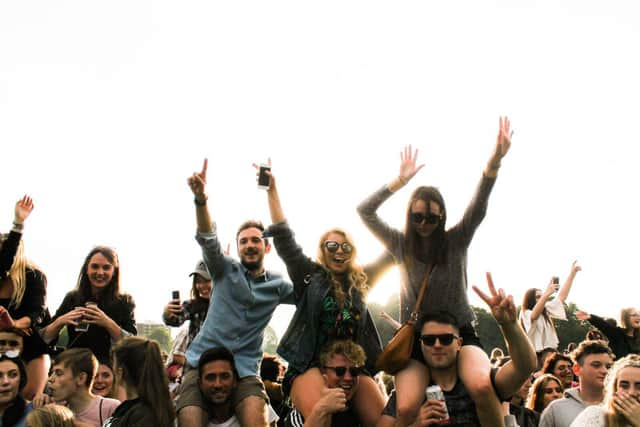Women's World Cup Finals: Why you need to get to an outdoor venue this week
This article contains affiliate links. We may earn a small commission on items purchased through this article, but that does not affect our editorial judgement.
and live on Freeview channel 276
If you couldn’t get to Australia for the Women’s World Cup finals fast approaching this week, head to a bar or outdoor venue. As it’s an immersive way to boost mental health from the euphoria of the collective atmosphere.
As recent studies have investigated the potential benefit of attending live sporting events and increased life satisfaction and reduced loneliness. With researchers positing that live sporting events could potentially enhance public health policy as a therapeutic outlet.
Post-pandemic mood


Advertisement
Hide AdAdvertisement
Hide AdThe COVID-19 pandemic may have led to increased social anxiety, however live sports and music events have and can continue to help people recover. “If we loved live events before they were stripped from our lives, we appreciate them with a fiery passion now.” (Rolling Stone) As the thrill of being part of a roaring crowd, the palpable energy of the stadium and witnessing world class athletes all contributes to a surge in endorphins that reduces stress and lifts mood.
“COVID-19 has been traumatising” (Bethany Juby and Beth Ann Mayer) potentially leading to apprehension about crowded spaces and triggering social anxiety. “The COVID-19 pandemic has resulted in negative mental health outcomes throughout the world, and its impact on social interactions and relationships is likely to be evident in problematic social anxiety.” (Kindred R, Bates GW.)
The desire for live events has surged in the aftermath of the pandemic. The widespread social anxiety triggered by the COVID-19 crisis led to a notable increase. As prolonged isolation and social distancing have disrupted bonds and intensified feelings of solitude and unease. In this challenging landscape, live sports and music events emerged as critical catalysts for recovery.
What does the research say?
A 2023 study examined survey data encompassing 7,209 individuals aged 16 to 85 residing in England. (Keyes H, Gradidge S, Gibson N, Harvey A, Roeloffs S, Zawisza M and Forwood S)
Results:
-
Participating in a live sports event resulted in elevated self-reported levels of life satisfaction and reduced feelings of loneliness.
-
Those who had taken part in a live sporting event in the previous year were more prone to express that their lives held value. Attending a live sports event was a stronger predictor of heightened self-reported life satisfaction compared to certain demographic factors like age or employment, which typically reflect one's perception of life's worth.
-
Researchers noted a comparable impact in terms of loneliness; however, no such effect was observed in relation to self-reported anxiety or happiness.
Advertisement
Hide AdAdvertisement
Hide AdThe researchers highlighted that the data doesn't necessarily imply a causal link between watching live sports and experiencing those benefits. The researchers hypothesise that the social engagement inherent in sporting events might create a sense of belonging, potentially reducing feelings of loneliness. (Washington Post) “Our findings could be useful for shaping future public health strategies, such as offering reduced ticket prices for certain groups,” (Helen Keyes, Anglia Ruskin University)
5 ways attending live sports can boost wellbeing
So, here are five ways live sporting events can boost mental health and help reduce social anxiety, curated by TXODDS:
1. Social Interaction: Live events create opportunities for social interactions with like-minded individuals. Which fosters a sense of belonging and community. Being part of a crowd with shared interests can help individuals feel connected and less isolated, reducing feelings of loneliness and social anxiety. Sharing a memorable experience at an event can lead to bonding and easing social interactions beyond the event.
2. Escapism: Engaging in the excitement and energy of a live event can divert attention away from negative thoughts and worries, providing a temporary respite from stressors and anxiety triggers. As live events often bring moments of joy, laughter, and positive emotions. These experiences can help counteract the effects of anxiety and depression, leading to an overall improvement in mental well-being.
Advertisement
Hide AdAdvertisement
Hide Ad3. Emotional outlet: Both sports and music can provide an emotional outlet, allowing attendees to express and release pent-up emotions in a safe and controlled environment, reducing emotional tension and anxiety. “Listening to 'extreme' music makes you calmer, not angrier, according to study”. (The Guardian) As participating in physical activities at events triggers the release of endorphins. The Journal of the American Medical Association Network Open empirically confirmed that “music interventions are linked to meaningful improvements in wellbeing”, as measured quantitatively via standardised quality-of-life survey data.” (The Guardian)
4. Being in the moment: Engaging in the present moment during live events can encourage mindfulness, in terms of diverting attention away from regrets or concerns, and promoting a sense of calm.
5. Inspiration: Watching athletes excel or listening to music performances can inspire attendees to set and pursue their own goals, fostering a sense of purpose and reducing feelings of hopelessness.
Overall, the COVID–19 pandemic led to increased social anxiety, and live sports and music events have and can continue to help people recover. Live sporting events could potentially enhance public health policy as a therapeutic outlet. In terms of boosting well-being, social connections, and overall quality of life.
Advertisement
Hide AdAdvertisement
Hide AdSo, whether it's a live event or watching in a bar or outdoor venue, all of which can provide an immersive way to elevate mental health from the euphoria of the collective atmosphere. As the world continues to navigate towards a new normal, these events are essential opportunities to rebuild our social connections.
Disclaimer: The story is not official medical advice. If you or someone you know is struggling with anxiety, it's advisable to first seek guidance from your GP, mental health professional or call the NHS 111 line.